
The European Commission on Wednesday proposed new legislation to grant itself extra powers to impose trade sanctions if the European Union’s economic interests are threatened.
The Anti-Coercion Instrument aims to speed up the adoption of restrictive measures by using the EU’s exclusive competences on trade, exercised by the European Commission.
The proposal is highly sensitive since it touches upon the crossroads of trade and foreign policy, and seeks to circumvent the often slow or politicized decision-making procedure on sanctions that requires a unanimous decision by EU foreign ministers.
“The European Union will stand firm in defending itself. The European Union will not hesitate to push back when we are under threat,” Valdis Dombrovskis, the commission’s executive vice president, said at a news conference.
He said the new tool against “economic intimidation” is necessary because of the current “conflictual geopolitical environment.”
The law would mandate the European Commission “to apply trade, investment or other restrictions towards any non-EU country unduly interfering in the policy choices of the EU or its Member States,” the EU’s executive body explained in a press release.
The proposal defines economic coercion as a situation where a non-EU country seeks to pressure the EU or a member country “into making a particular choice by applying or threatening to apply, measures affecting trade or investment,” such as import duties, selective border checks and state-sponsored boycotts.
The legislation, which confers significant powers to the EU’s executive body, is yet to be adopted by the European Parliament (EP) and member countries.
The EP is highly likely to greenlight the proposal since it has already called for similar actions, but some national governments might oppose the move because trade-related measures interfere with foreign policy and could be viewed as impinging upon national sovereignty.
According to a report by news outlet Politico, Ireland, the Czech Republic and Sweden have already voiced concerns about the draft legislation’s impact on foreign policy and trade.













